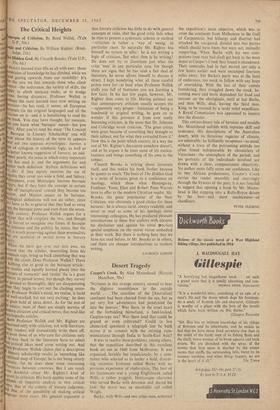Desert Tragedy
Cooper's Creek. By Alan Moorehead. (Hamish Hamilton, 30s.) `Norsimo in this strange country seemed to bear the slightest resemblance to the outside world. . . . The coastline of the [Australian] continent had been charted from the sea, but as yet very few adventurers had penetrated far into the interior.' Was there, in the cruel heart of the forbidding hinterland, a land-locked, Caspian-type sea? Was there land that could be grazed or even cultivated? Could (a less chimerical question) a telegraph line be built across it to connect with the existing com- munications through India to South-East Asia?
It was to resolve these problems, among others, that the expedition described in this excellent book set out in 1860 from Melbourne. It was organised, lavishly but injudiciously, by a com- mittee who selected as its leader a bold, disarm- ing, eccentric Irishman called Burke with no previous experience of exploration. The best of his lieutenants was a young Englishman called Wills, a rather priggish, Hentyesque character who served Burke with devotion and shared his fate; the worst was an unreliable oaf called Wright. "
Burke, with Wills and two other men, achieved the expedition's main objective, which was to cross the continent from Melbourne to the Gulf of Carpentaria; but lethargy and disarray had attacked the rearguard, divided into two parties which should have been, but were not, mutually supporting. When Burke with his two com- panions (one man had died) got back to the main depot at Cooper's Creek they found it abandoned. Their comrades had in fact moved out only a few hours earlier and were encamped fourteen miles away; but Burke's party was at the limit of endurance, too weak to follow with any hope of overtaking. With the last of their camels foundering, they struggled down the creek, be- coming more and more dependent for food and succour on the aboriginals, until at last Burke, and then Wills, died, leaving the third man, King, to be rescued by a tardy relief expedition. A Royal Commission was appointed to inquire into the disaster.
This extraordinary tale of heroism and muddle Mr. Moorehead unfolds with supreme skill and assurance. His descriptions of the Australian desert, with its ferocious vagaries of climate, are admirable; he brilliantly recaptures—as usual, without a trace of the patronising attitude too often found indispensable by chroniclers of Victoriana—the atmosphere of the period; and his portraits of the individuals involved are drawn with a clear, compassionate objectivity. No author more fully earns our confidence. Like its two African predecessors, Cooper's Creek carries the reader smoothly and unerringly through the byways of the past; it is not fanciful to suggest that opening a book by Mr. Moore- head is like stepping into a Rolls-Royce driven by the best—and most unobtrusive—of chauffeurs.
PETER FLEMING






































 Previous page
Previous page